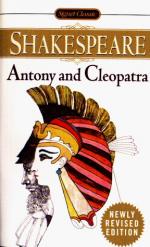|
This section contains 8,461 words (approx. 29 pages at 300 words per page) |

|
SOURCE: Blissett, William. “Dramatic Irony in Antony and Cleopatra.” Shakespeare Quarterly 18, no. 2 (spring 1967): 151-66.
In the following essay, originally delivered as a lecture in 1962, Blissett explores Antony and Cleopatra's use of dramatic irony, focusing in particular on the dramatic irony generated from the nature of the theater and from the audiences' interpretations of the play's characters and events.
ANT.
Ho now, Enobarbus!
ENO.
What's your pleasure, sir?
ANT.
I must with haste from hence.
ENO.
Why, then we kill all our women. We see how mortal an unkindness is to them; if they suffer our departure, death's the word.(1)
Antony, one may imagine, looks a little distraught; and a slight operatic tremolo carries over from the well-turned bel canto tribute to his late wife Fulvia. Enobarbus knows his man even if he does not know the news: his remarks are dry and pointed—ironic, in a sense...
|
This section contains 8,461 words (approx. 29 pages at 300 words per page) |

|


